Howard Marks’ latest memo, “Nobody Knows (Yet Again),” is a stark reminder of how unpredictable the world—especially the economy—can be.
Drawing parallels to the 2008 financial crisis and the COVID-19 pandemic, Marks emphasizes that certainty is a luxury we rarely have, especially during upheavals. “There’s absolutely no place for certainty in the world of investing,” he writes, “and that’s particularly true at turning points and during upheavals.”
His message is clear: when everything feels like it’s falling apart, the best we can do is make logical moves, even if they come with a side of trepidation.
The memo zeroes in on the recent tariff announcements by the Trump administration, which have sent shockwaves through markets. Marks doesn’t mince words about the potential fallout.
“The impact on economies and the world at large is entirely unpredictable,” he says, pointing out that modern trade wars are uncharted territory. Economists and experts are just as clueless as the rest of us because, as Marks puts it, “there have been no large-scale trade wars in the modern era; thus, the theories are untested.”
This isn’t just about higher prices for consumers—though that’s a given—it’s about a domino effect of retaliation, inflation, and possibly even recession.
One of the most striking parts of the memo is Marks’ breakdown of why tariffs might backfire. He lists the goals—supporting U.S. manufacturing, shrinking the trade deficit, etc.—and acknowledges they’re all “desirable in itself.”
But then he drops the hammer: “The problem is that in the real world, and especially in economics, there are second- and third-order consequences that must be considered.”
For example, he notes that while tariffs might save some jobs in protected industries, they could kill far more in industries that rely on imported materials. “Economics is the science of choices and is fraught with trade-offs,” he writes. “That’s certainly true in the area of trade and tariffs.”
Marks also warns about the international ripple effects. The U.S. has spent decades building goodwill through trade and alliances, but tariffs could undo that.
“We can antagonize our trading partners and cause our allies to feel like they’re being bullied and extorted,” he says. Worse, it might push other countries to rely less on the U.S. and more on rivals like China or Russia. And let’s not forget the debt problem.
The U.S. has been living on a “golden credit card,” Marks quips, but if other nations lose faith in our fiscal management, that could spell trouble for everything from Treasury rates to the dollar’s status as the world’s reserve currency.
So what’s the bottom line? Marks doesn’t pretend to have all the answers, but he’s skeptical. He calls the tariffs an “own goal”—a self-inflicted wound akin to Brexit.
“The negative ramifications from tariffs will probably be felt almost immediately,” he writes, “any gains are likely to come only in the long run.” Still, he leaves room for nuance: “No one should rule out the achievement of some of the goals of tariffs,” he admits, but the risks are high, and the outcomes are anyone’s guess.
In classic Marks fashion, he ends on a note of cautious optimism. Despite the chaos, he’s sniffing around for bargains, just like he did in 2008.
“Now, with heretofore unimaginable risks on the table and priced in, it’s appropriate to sniff around for bargains: the babies that are being thrown out with the bath water. We’re on the case.” he says.
It’s a reminder that even when nobody knows what’s coming next, there’s always a way forward—if you’re willing to think critically and act without the comfort of certainty.
You can read the entire memo here:
Howard Marks Memo – Nobody Knows (Yet Again)
For all the latest news and podcasts, join our free newsletter here.
Don’t forget to check out our FREE Large Cap 1000 – Stock Screener, here at The Acquirer’s Multiple:




One Comment on “Howard Marks: Tariffs, Turmoil, and Where to Find Opportunities”
International trade is not about being nice to other countries, it’s about having more equitable trade. Other countries have had much more favorable trade (i.e. imposing higher tariffs) than the U.S. for decades, and now the increased tariffs by the U.S. is forcing negotiation.